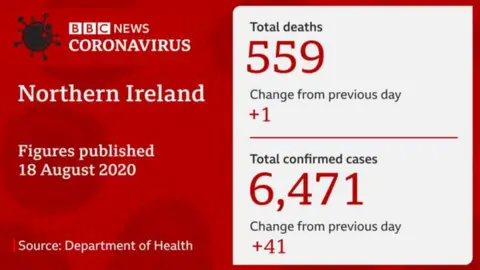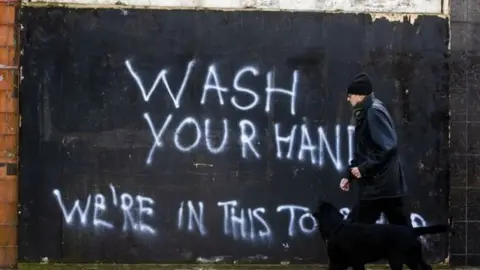Coronavirus: Robin Swann says NI is in danger of sliding down slope
 Kelvin Boyes/Press Eye
Kelvin Boyes/Press EyeRobin Swann has given the strongest hint yet that local lockdown measures or other restrictions could soon be reimposed to curb the spread of Covid-19 in NI.
The health minister was speaking at the first Stormont press conference to take place in more than six weeks.
On Tuesday, one more death was recorded bringing the death toll to 559.
Mr Swann warned that NI was in danger of "sliding down a very slippery and treacherous slope".
Forty-one new cases of coronavirus have also been recorded by the Department of Health, bringing its total to 6,471.
NI's Chief Scientific Adviser Prof Ian Young said officials were seeing an indication of an increase in hospital admissions, but that they remained at a "low level".
"If cases continue to rise it's inevitable hospital admissions and deaths will rise in the future," he told the press conference.
'Covid-19 won't just go away'
Almost 300 new cases have been confirmed in Northern Ireland over the past seven days.
Mr Swann warned that people needed to realise the virus was still present in Northern Ireland.
"It is not inevitable, we can still arrest that slide but this requires decisive action from all of us," he added.
"Covid-19 won't go away just because we are fed up with it."

The minister said he wanted to "address doubters and critics" who had accused him of exaggerating the threat posed by the virus.
"They'll say infections are mainly impacting young people - this argument overlooks the fact there can be a time lag between infection and people becoming ill," added Mr Swann.
He said there were always fine judgements to be made, but warned that the executive would soon need to consider the next steps in a bid to stop the virus from spreading more widely within the community.
"The time is coming for the executive to consider fresh and concrete actions to prevent further spread of the virus," said the minister.
"This could include imposing localised restrictions or general measures or a combination of both.
 PA Media
PA Media"Given where we are now, Thursday's executive meeting will have important decisions and options to consider."
The executive has to regularly consider the coronavirus lockdown restrictions, the latest of these being due to take place in two days' time.
Prof Ian Young, the chief scientific advisor, said the figures showed that NI has a higher rate per 100,000 of the population than the rest of the UK at present.
He said Northern Ireland's rate currently showed 24 cases per 100,000 over the past 14 days, evidence that pointed to the virus spreading again.
Prof Young added that the number of new cases had increased 10-fold since the start of July and warned that "increased testing is not sufficient to explain the increasing number of cases".
Northern Ireland's Chief Medical Officer, Dr Michael McBride said he did not want anyone to be in a position to reflect in the future and think they should have done more or "listened more carefully to the advice".
He said the executive could need to look at restrictions on the number of people gathering outdoors.
"If indeed we see particular clusters related to particular establishments such as pubs or restaurants those also may be things we need to look at," he added.
During Tuesday's press conference, Mr Swann also said the Department of Health's contract tracing app for Covid-19 had been downloaded almost 276,000 times so far.
Flu vaccine scheme expanded
The department is also expanding its flu vaccination programme ahead of the winter season, due to the ongoing pandemic.
The programme officially begins on 1 October, however the department said it was likely that deliveries of the vaccine will arrive from the end of this month, enabling the programme to commence in September once GPs have received their initial orders.
The current groups eligible for a free flu vaccination are people aged 65 and over, pregnant women, those aged under 65 years of age in clinical "at risk" groups, all children aged 2 to 4, primary school pupils and frontline health and social care workers.
The department said additional supplies had been secured so that other groups of people could receive a free vaccination this year, which include:
- Household contacts of those who received shielding letters during the Covid-19 pandemic can request vaccination via their GP
- Staff in independent care homes
- School children who will be in the first year of secondary school from September 2020
The programme could be extended by the end of the year to include those in the 50 to 64 age group, depending on eligibility of the vaccine, and will be phased to prioritise people deemed to be at risk.
